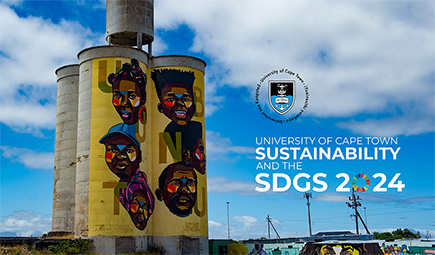
Shortly after the ambitious and wide-ranging United Nations (UN) Sustainable Development Goals (SDGs) were adopted in 2015, the University of Cape Town (UCT) ran a scoping exercise to explore how closely its research mapped onto them. The degree to which the SDGs spoke to UCT’s priorities and strengths in research was startling, but not entirely surprising.
Senior UCT researchers were among the world-leading academics involved in lobbying for and drafting the SDGs. Professor Haroon Bhorat, for instance, served as head of research for the High-Level Panel appointed by Ban Ki-moon to deliver a proposed SDG agenda to the UN General Assembly. Members of the UCT African Centre for Cities participated in a global campaign to ensure that sustainable cities were explicitly included in the SDGs – a fight that had been lost with the Millennium Development Goals. Similarly, Professor Crick Lund, one of the leaders in the field of global mental health, lobbied to have it included in the SDGs.
There is also a natural synergy between the SDGs, the African Union’s Agenda 2063 (also adopted in 2015), and UCT’s strategic research and teaching strengths and priorities.
UCT has long focused on responding to the most critical problems facing South Africa and the continent: inequality, climate change, food and water insecurity, unemployment, safe cities. These are global grand challenges, but Africa is at the frontline of their impact. Universities on the continent have a critical role to play in addressing these problems through research that emanates from an understanding of local contexts and in developing capacity to enable the continent to solve its own problems, in partnership with – rather than relying on – the Global North.
The university’s new strategy, Vision 2030, states this explicitly: UCT’s research is committed to “unleashing knowledge in and for Africa” and to play a key role in finding solutions for a more just and sustainable world.
These pages showcase the work UCT is doing towards the SDGs.

UCT Sustainability and the SDGs 2024
UCT is committed to addressing the most critical problems facing the continent and the rest of the world. This report tracks the progress UCT is making towards the United Nation’s Sustainable Development Goals (UN SDGs) and the African Union Agenda 2063.
UCT in impact rankings
UCT broke into the top 100 for the first time, ranking 77th in the world and 7th for partnerships for the goals, while also performing well in five other United Nations Sustainable Development Goals (UN SDGs).
Campus sustainability
UCT’s environmental sustainability strategy, drafted in 2019, includes long-term objectives that cover achieving net zero water, net zero waste and net zero carbon by 2050 – ambitious goals in the African context.
SDGs Africa Summit 2021
The International Summit on the SDGs in Africa, hosted online by UCT brought together representatives from higher education, government and civil society to participate in thought-provoking discussions on solving Africa's development challenges.
Working towards the SDGs
Latest news



















